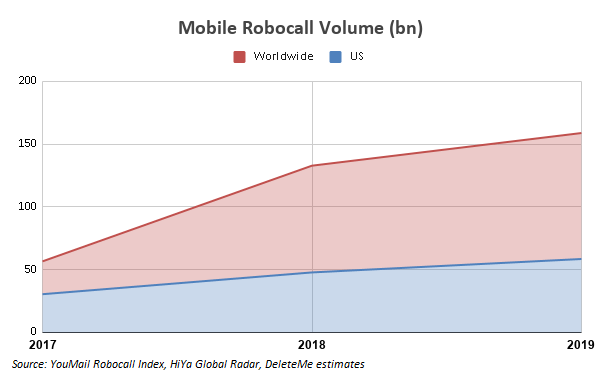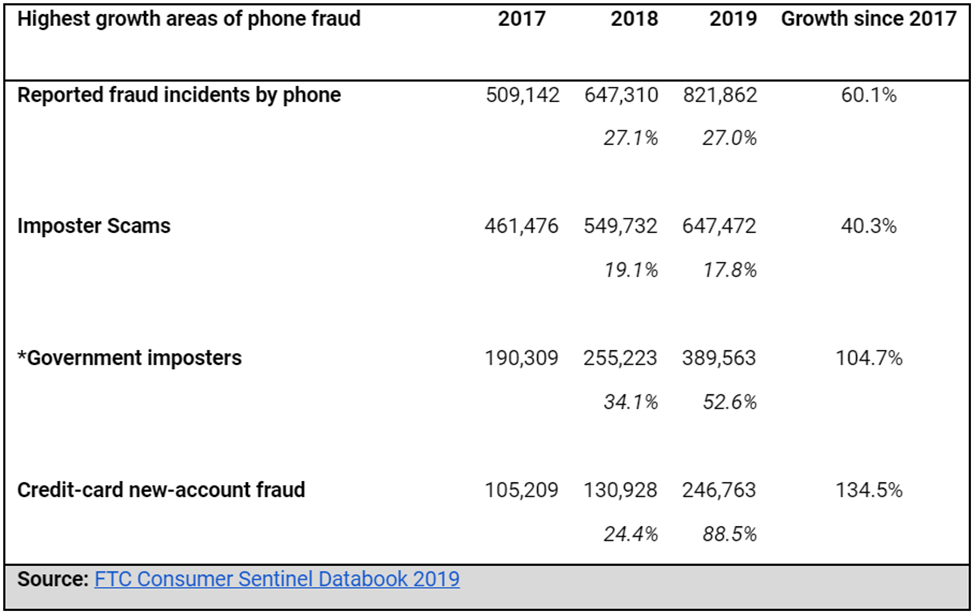An Updated Look at Robocall Statistics
Will Simonds
Reading time: 4 minutes
There has been a lot in the news lately about the rapid growth and changing nature of malicious phone-scams, including both automated Robocallers as well as live phone-scammers.
If you have to personally block every unwanted call, you’ve already lost, right?
Between 2017 and 2019, growth in unwanted harassing calls effectively doubled, and consumer complaints to government agencies (like FTC Consumer Sentinel and FCC’s Do Not Call List) grew so rapidly that congress began agitating for more aggressive government response, passing multiple bills over the course of 2019, eventually culminating in the TRACED Act, signed into law in January 2020.

The boom in Robocalls over the past five years has also seen growing consumer adoption of mobile call-blocking apps, as well as services like NoMoRobo which specialize in VOIP landline call blocking.
Most recently, phone-carriers themselves like T-Mobile / Sprint, Verizon, and AT&T have begun rolling out competitive offerings to their users, promising to help combat unwanted phone-calls by providing fuller-featured caller-ID services, and participating in the SHAKEN/STIR consortium which promises to create a more stringent standard for caller verification, and should help reduce local-number spoofing and other techniques employed by phone scammers.
A common feature of legislative efforts, as well as the technical solutions being offered to consumers, is they deal with the Robocall problem “after it happens”; providing new tools for FCC to punish violators, or attempting to stop calls at the point the phone has already begun to ring.
(some have noted that even the SHAKEN/STIR protocol doesn’t do anything to stop malicious calls from getting through to anyone, just that it will help enable warning screens about unverified callers)
What few are doing, however, is looking at who is being targeted, why, and how the Robocallers themselves execute their scams, and attempting to prevent people from becoming targets in the first place.
While some phone scammers still engage in wide-net, ‘dumb’ calling of randomized phone numbers, these are typically the lowest-threat form of phone fraud. These are often recordings that offer to ‘claim a prize’, or a car-warrantee extension, or claim a computer has been infected with a virus.
The most pernicious phone scams, which have been growing in both frequency and in average-damages caused to consumers, tend to be those with a more individually-targeted identity theft component. The most notable examples of these have been the growth in “Government Imposters”: phone scammers pretending to represent the Social Security Administration, HHS/Medicare, the IRS, or police departments claiming to require a bail payment for a relative.

What makes imposter scams particularly effective, and particularly lucrative (a total of $667m in financial damages caused in 2019, according to FTC), is that many of the worst robocall scams rely on detailed information previously gathered online about targets in order to then exploit them.
As noted by Business Insider:
“…criminals who employ this type of scam are successful in part because they already have some of their potential victim’s information, including grandchildren’s names, phone numbers, and even addresses. The FTC notes that these scammers typically buy or steal this personal information in order to sound legitimate to potential victims.”
What congress, app developers, or phone carriers have so far been unable to do with their efforts to reduce Robocalls, is anything that targets the data brokers: the companies that sell consumers personal information online. These companies like Whitepages.com, Spokeo, Mylife, and Radaris sell consumer’s personal phone numbers to anyone willing to pay – including phone scammers.
And this is where DeleteMe provides a particular point of advantage relative to peers in the digital privacy world.
What DeleteMe does to help mitigate phone-fraud is to deny scammers the information they need to make a target a viable candidate for exploitation. If scammers don’t know anything about you other than your phone number and name, you no longer represent an attractive target.
Rob Shavell, CEO of DeleteMe noted recently that information about users found at the largest online Data Broker sites is getting both more-detailed, and more accurate in recent years, making them far more reliable resource for scammers.
“We are now seeing profile data containing accurate address and phone numbers (including mobile phone numbers) for nearly 75% of customers – a huge increase from prior years.”
Those who are trying to help mitigate the damages caused by phone-fraud need to take a closer look at how these online sources of data help enable the problem, and inform consumers how they can better protect themselves before the phone ever rings.
Our privacy advisors:
- Continuously find and remove your sensitive data online
- Stop companies from selling your data – all year long
- Have removed 35M+ records
of personal data from the web
Save 10% on any individual and
family privacy plan
with code: BLOG10
news?
Don’t have the time?
DeleteMe is our premium privacy service that removes you from more than 750 data brokers like Whitepages, Spokeo, BeenVerified, plus many more.
Save 10% on DeleteMe when you use the code BLOG10.

















